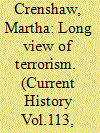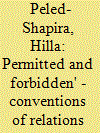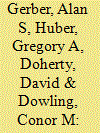| Srl | Item |
| 1 |
ID:
127589


|
|
|
|
|
| Publication |
2014.
|
| Summary/Abstract |
Terrorism, a form of violence that deliberately rather than inadvertently targets civilians, should be understood as a process that evolves over long periods of time, rather than as a series of discrete events. This approach helps place the cataclysmic events of September 11, 2001, in comparative perspective. It also avoids the erroneous assumption that radical Islamism and terrorism are synonymous. From a long-term perspective, 9/11 marked neither a culmination of a trend nor a completely new phenomenon. Terrorism is not static-strategy adapts to circumstances and profits from technological advances; states take effective precautions; different ideologies and conditions motivate violence-but there are also important continuities.
|
|
|
|
|
|
|
|
|
|
|
|
|
|
|
|
| 2 |
ID:
120850


|
|
|
|
|
| Publication |
2013.
|
| Summary/Abstract |
This paper examines the difference in the way romantic connections between men and women are presented in the novels of the émigré Iraqi author Gha?ib u?ma Farman (1927-90) in comparison to the preceding generation of writers, as an expression of how ideology affected the artistic course taken by Communist authors, in view of the fact that relations between the sexes were a taboo subject in Arab literature. The paper shows the ways in which Farman copes with the taboo in the conservative patriarchal society in which he grew up and the rhetorical and thematic devices he uses to shatter accepted conventions. The works serve as a prism to examine the triple bond between political and social ideology, language and coping with issues of the relations between the sexes, by exploring selected issues relating to sexuality as expressed in these works: sexual relations outside marriage, forced marriage or prevention of marriage, and the treatment of the daughter-in-law by the husband's family.
|
|
|
|
|
|
|
|
|
|
|
|
|
|
|
|
| 3 |
ID:
099289


|
|
|
|
|
| Publication |
2010.
|
| Summary/Abstract |
Previous research on personality traits and political attitudes has largely focused on the direct relationships between traits and ideological self-placement. There are theoretical reasons, however, to suspect that the relationships between personality traits and political attitudes (1) vary across issue domains and (2) depend on contextual factors that affect the meaning of political stimuli. In this study, we provide an explicit theoretical framework for formulating hypotheses about these differential effects. We then leverage the power of an unusually large national survey of registered voters to examine how the relationships between Big Five personality traits and political attitudes differ across issue domains and social contexts (as defined by racial groups). We confirm some important previous findings regarding personality and political ideology, find clear evidence that Big Five traits affect economic and social attitudes differently, show that the effect of Big Five traits is often as large as that of education or income in predicting ideology, and demonstrate that the relationships between Big Five traits and ideology vary substantially between white and black respondents.
|
|
|
|
|
|
|
|
|
|
|
|
|
|
|
|